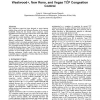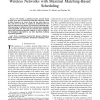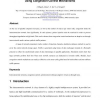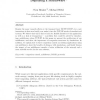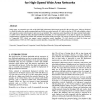CN
2004
14 years 20 days ago
2004
The increasing popularity of streaming video is a cause for concern for the stability of the Internet because most streaming video content is currently delivered via UDP, without ...
CCR
2004
14 years 20 days ago
2004
TCP congestion control has been designed to ensure Internet stability along with fair and efficient allocation of the network bandwidth. During the last decade, many congestion co...
CCR
2004
14 years 20 days ago
2004
Current congestion control algorithms treat packet loss as an indication of network congestion, under the assumption that most losses are caused by router queues overflowing. In r...
TON
2008
14 years 21 days ago
2008
We consider a multi-hop wireless network shared by many users. For an interference model that constrains a node to either transmit to or receive from only one other node at a time,...
TIT
2008
14 years 22 days ago
2008
We are interested in the connection-level stability of a network employing congestion control. In particular, we study how the stability region of the network (i.e., the set of off...
PE
2008
Springer
14 years 23 days ago
2008
Springer
As the size of parallel computers increases, as well as the number of sources per router node, congestion inside the interconnection network rises significantly. In such systems, ...
COMCOM
2007
14 years 25 days ago
2007
Despite the many research efforts at the transport layer (SCTP, DCCP, etc.), new innovations in that area hardly ever make it into the TCP/IP stacks of standard end systems. We b...
CN
2007
14 years 25 days ago
2007
Efficient multicast congestion control (MCC) is one of the critical components required to enable the IP multicast deployment over the Internet. Previously proposed MCC schemes ca...
CN
2007
14 years 25 days ago
2007
In this paper, we summarize our work on the UDT high performance data transport protocol in the past four years. UDT was designed to effectively utilize the rapidly emerging high-...
CN
2007
14 years 25 days ago
2007
Receiver-driven TCP protocols delegate key congestion control functions to receivers. Their goal is to exploit information available only at receivers in order to improve latency ...

